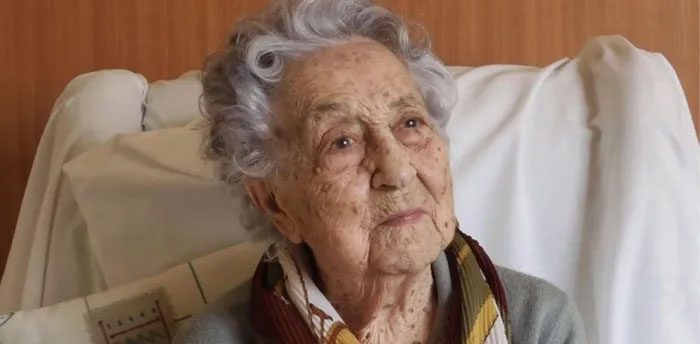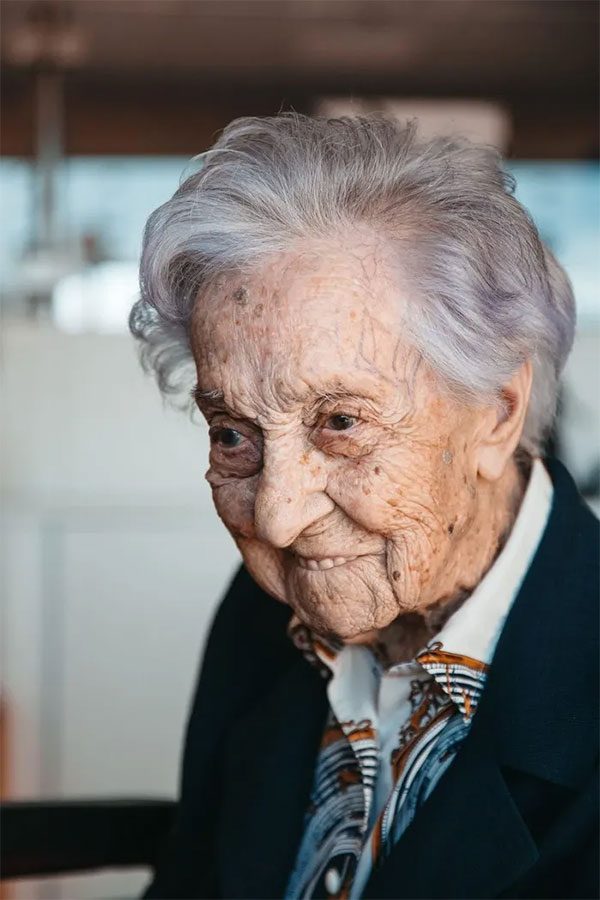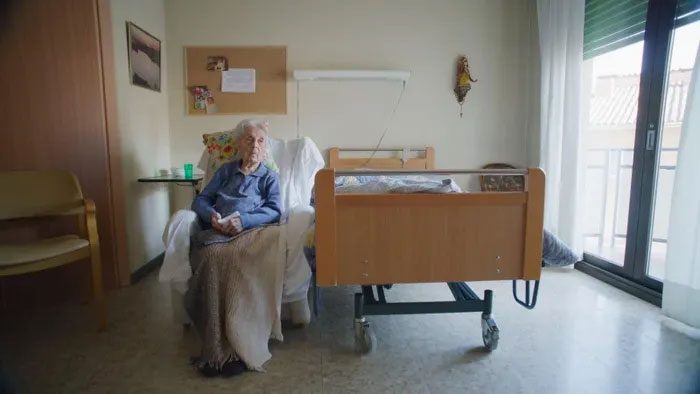When asked about her secret to longevity, 117-year-old Maria Branyas simply shook her head and said: “I don’t do anything special to live to this age.”
Branyas lives in a nursing home in northeastern Spain and recently celebrated her 117th birthday with a cake and a small family gathering, according to El País.

Maria Branyas.
Her youngest daughter, 80-year-old Rosa Moret, stated: “We have to separate when we visit her because she doesn’t like being too close to many people.” Branyas’s spirits have “declined” in recent months. Her daughter mentioned that she is not in pain but “is getting weaker.”
Branyas is fully aware of her surroundings, despite her hearing loss and diminished mobility. While many wonder what it’s like to live beyond a century, Branyas remains calm, seemingly unfazed by the media frenzy outside the nursing home.
Good Genes and Healthy Habits
In January 2023, after Lucile Randon (from France) passed away at the age of 118, Branyas, then 115, became the oldest living person in the world.
The media came knocking. The city where she was born – San Francisco (California, USA) – honored the expatriate. Her family received dozens of phone calls, and her son-in-law set up a Twitter account (now X). Filmmaker Sam Green interviewed her for a documentary.
Everything suddenly changed. The influx of visitors forced the family to turn people away. “She no longer has the strength for that,” they said.
In spring 2023, cancer expert Manel Esteller contacted Branyas’s nursing home to request a conversation with the family of the centenarian. He wanted to study the cells of someone who has reached such a rare age.
“We have never touched the cells of a 117-year-old. It’s very rare,” Esteller remarked.
In Spain, there are nearly 20,000 people over 100 years old, including 758 who have surpassed 105. The National Statistics Institute cannot disclose exact figures on those over 110 due to privacy laws. According to LongeviQuest, Spain has at least 3 “supercentenarians” still alive, but the agency only lists those who have voluntarily shared their personal information.
 Maria Branyas is currently the oldest living person in the world.
Maria Branyas is currently the oldest living person in the world.
“Is there anything you wish for in this life?” Esteller asked her. “Death,” Branyas replied.
Branyas does not suffer from cancer, neurodegeneration, or heart issues. She realizes that as each day passes, life becomes more extraordinary, and death is no longer a taboo subject. “I feel like I have lived longer than expected. Death is like an old friend that you know will visit at any time. I have been ready for a while now, and I think ‘he’ will come knocking soon. I just want to have the peace to face whatever happens to me and enough happiness to enjoy the good things. I will never become miserable, no matter what life throws at me,” she shared.
Esteller took samples of Branyas’s blood and urine. He stated: “We will study the genes, bacteria, proteins, and metabolic processes to uncover clues explaining her longevity and investigate any genetic mutations.”
Even without compelling results, this scientist already has some data: Branyas’s cells are approximately 10 years younger than her chronological age. Esteller, who compares genetics to playing cards, said: “That’s because Branyas has been dealt great cards and has played them very well for 117 years.”
Genes, like cards, can be good or bad, but you must “know how to play well” to endure for long. “If you have good cards but don’t know how to play, you won’t get lucky. In Branyas’s case, it seems she ‘hit the jackpot’ with good genes and healthy habits.”
However, the wear and tear of 117 years can be seen under a microscope. “The cells of the elderly no longer have the protective caps on their chromosomes. And she hardly has any stem cells or immune system cells left.”
Branyas’s family tree shows a higher than average number of people over 80. “Her daughter is also younger than 80,” Esteller added. When speaking on the phone, Rosa seems confident and decisive. She responds quickly, specifically, and sometimes with a hint of humor.
Never in a Hurry
Rosa recalls a typical family life where her mother mostly stayed at home. “My mother was a housewife with a calm life, little work pressure. She thinks life today is difficult, but perhaps that’s just the old story of every generation.”
Branyas would shop, knit, clean the house, and cook. She never rushed when doing anything. “Nowadays, young people prefer fast food or ready-made meals. But not us. Back then, dinner was always vegetables or perhaps a Spanish omelet with potatoes. Now they call it the Mediterranean diet.”
Branyas survived COVID-19 and the lockdown nearly 4 years ago. “People complained about being stuck at home, but we had electricity, phones, TV, food, hot water, and a roof over our heads. We didn’t have these things before. Humanity has overcome, and I have never lost my passion for life,” she shared during the pandemic.
This isn’t the first time she has faced adversity. Her father died at sea while returning to Barcelona from the US, and she survived the Spanish flu, two world wars, and the Spanish Civil War. All of these experiences have made her stronger. Esteller noted: “The fact is that those who have endured starvation have an advantage in survival.”

Branyas has never wished for or prepared to live beyond 110.
Spain ranks fifth globally in average life expectancy (83 years), behind Japan, Switzerland, South Korea, and Singapore. Japan is the only country with a blue zone – a geographical area with lower chronic disease rates and higher life expectancy.
Only one man among the first 40 supercentenarians recognized by the Gerontology Research Group has provided verified longevity data for the Guinness World Records. “It could be an evolutionary mechanism; women may live longer due to the pregnancy process,” Esteller explained.
Branyas’s outlook on life aligns with the psychological characteristics of supercentenarians. Lola Merino, a psychology professor at Complutense University of Madrid and a longevity researcher, found that people aged 100 and older excel at enjoying the little things in life and embracing positive emotions.
Merino believes that psychological aspects, along with genetics, diet, and physical activity, play a crucial role in longevity. “Longevity is due to many factors. Centenarians form strong bonds with others. They feel loved and express affection, which is very important.”
“On the day I have to leave this world, I hope some people will still wish for me to stay by their side a little longer. That’s all I wish for,” Branyas, who has never wished to be the oldest person in the world, expressed.


















































